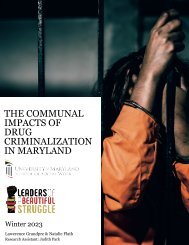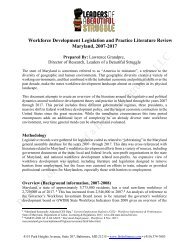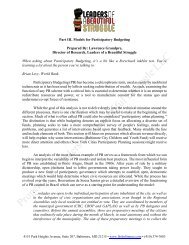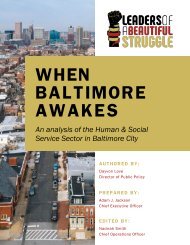Drug Decriminalization in Maryland Through an African Centered Research Paradigm- Analysis and Recommendations
This document offers guidance for theorizing questions related to a proposed research project purposed to advance drug decriminalization in Maryland.
This document offers guidance for theorizing questions related to a proposed research project purposed to advance drug decriminalization in Maryland.
- No tags were found...
Create successful ePaper yourself
Turn your PDF publications into a flip-book with our unique Google optimized e-Paper software.
3. Respect for <strong>an</strong>d active perpetuation of th<strong>in</strong>gs Afric<strong>an</strong>: Afric<strong>an</strong> life <strong>an</strong>d Afric<strong>an</strong> cultural<br />
<strong>in</strong>stitutions.<br />
4. Ma<strong>in</strong>ta<strong>in</strong><strong>in</strong>g a st<strong>an</strong>dard of conduct of resolute <strong>an</strong>d uncompromis<strong>in</strong>g resist<strong>an</strong>ce to all<br />
th<strong>in</strong>gs <strong>an</strong>ti-Afric<strong>an</strong>.<br />
Together, the dimensions of ASC echo a common theme: ethnic con-sciousness engenders<br />
group commitment. Regard<strong>in</strong>g drug abuse, it is assumed that as a youth's ASC<br />
decreases,his or her level of subst<strong>an</strong>ce abuse is likely to <strong>in</strong>crease. It is further assumed that<br />
when <strong>an</strong> Afric<strong>an</strong>-Americ<strong>an</strong> youth does not <strong>in</strong>ternalize high ASC, he or she will probably<br />
not be as concerned with elim<strong>in</strong>at<strong>in</strong>g the oppression that black people face <strong>an</strong>d, thus, would<br />
have little desire to adv<strong>an</strong>ce black people politically, culturally, <strong>an</strong>d economically. To the<br />
extent that a youth is not conscious of the oppression of people of Afric<strong>an</strong> descent, one may<br />
be unaware of the m<strong>an</strong>ifold subtle <strong>an</strong>d <strong>in</strong>sidious ways the system of oppression ma<strong>in</strong>ta<strong>in</strong>s<br />
control over Afric<strong>an</strong> Americ<strong>an</strong>s. The over availability of illicit drugs <strong>an</strong>d liquor stores <strong>in</strong><br />
m<strong>an</strong>y Afric<strong>an</strong>-Americ<strong>an</strong> communities probably would not be recognized by persons with<br />
low ASC as a possible strategy to dom<strong>in</strong>ate <strong>an</strong>d m<strong>an</strong>ipulate Afric<strong>an</strong> Americ<strong>an</strong>s. Therefore,<br />
youths with this m<strong>in</strong>d-set may be at a greater risk of abus<strong>in</strong>g subst<strong>an</strong>ces because they lack<br />
underst<strong>an</strong>d<strong>in</strong>g of the political <strong>an</strong>d economic function of subst<strong>an</strong>ce abuse with<strong>in</strong> the context<br />
of oppression, as discussed earlier <strong>in</strong> this chapter. Moreover, persons with low ASC, as<br />
opposed to those with high ASC, may be less likely to participate <strong>in</strong> black liberation<br />
struggles <strong>an</strong>d, therefore, may fail to acknowledge that subst<strong>an</strong>ce abuse signific<strong>an</strong>tly<br />
<strong>in</strong>hibits their ability to optimally contribute to these struggles.<br />
Some evidence suggests that the ASC construct may help to explicate self-destructive<br />
behaviors among Afric<strong>an</strong>-Americ<strong>an</strong> drug abusers. In the only study uncovered that has<br />
exam<strong>in</strong>ed the effects of ASC on Afric<strong>an</strong>-Americ<strong>an</strong> drug abusers, Dixon <strong>an</strong>d Azibo (1998)<br />
found that Afric<strong>an</strong>-Americ<strong>an</strong> male crack-coca<strong>in</strong>e users who had ASC scores that<br />
represented a higher level of group commitment tended to participate less <strong>in</strong> exploitative<br />
me<strong>an</strong>s to earn a liv<strong>in</strong>g th<strong>an</strong> those who had ASC scores that demon-strated lower levels of<br />
Afric<strong>an</strong>-Americ<strong>an</strong> group commitment. Earn<strong>in</strong>g a liv<strong>in</strong>g via exploitative me<strong>an</strong>s was def<strong>in</strong>ed<br />
by the authors as participation <strong>in</strong> thefts, robberies, sell<strong>in</strong>g stolen goods, <strong>an</strong>d hustl<strong>in</strong>g<br />
people <strong>in</strong> licit <strong>an</strong>d illicit ways. Although Dixon <strong>an</strong>d Azibo did not exam<strong>in</strong>e whether lower<br />
ASC places one at greater risk of us<strong>in</strong>g or abus<strong>in</strong>g drugs, their f<strong>in</strong>d<strong>in</strong>gs are import<strong>an</strong>t <strong>in</strong><br />
that ASC may help to expla<strong>in</strong> the vari<strong>an</strong>ce <strong>in</strong> crim<strong>in</strong>al behavior among Afric<strong>an</strong>-Americ<strong>an</strong><br />
crack coca<strong>in</strong>e users <strong>an</strong>d abusers. Future research needs to explore the effects of ASC<br />
orientation on Afric<strong>an</strong> Americ<strong>an</strong>s who become drug abusers <strong>an</strong>d those who do not. In the<br />
Dixon <strong>an</strong>d Azibo study, all of the subjects were drug abusers.<br />
Although not us<strong>in</strong>g the ASC construct, Gary <strong>an</strong>d Berry (1985) found a signific<strong>an</strong>t<br />
relationship between awareness of racial oppression <strong>an</strong>d attitudes about subst<strong>an</strong>ce abuse<br />
among 411 r<strong>an</strong>domly sampled Afric<strong>an</strong> Americ<strong>an</strong>s. Awareness that racial oppression was<br />
4151 Park Heights Avenue, Suite 207, Baltimore, MD 21215 • www.lbsbaltimore.com • (410) 374-7683









